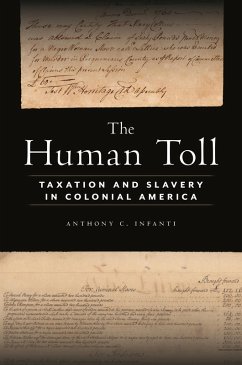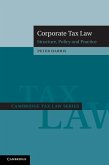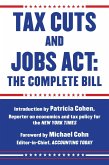How the thirteen colonies deployed the power of taxation to support, promote, and perpetuate the institution of slavery
The Human Toll documents how the American colonies used tax law to dehumanize enslaved persons, taxing them alongside valuable commodities upon their forced arrival and then as wealth-generating assets in the hands of slaveholders. Anthony C. Infanti examines how taxation also proved to be an important component for subjugating and controlling enslaved persons, both through its shaping of the composition of new arrivals to the colonies and through its funding of financial compensation to slaveholders for the destruction of their "property" to ensure their cooperation in the administration of capital punishment. The variety of tax mechanisms chosen to fund slaveholder compensation payments conveyed messages about who was thought to benefit from-and, therefore, who should shoulder the burden of-slaveholder compensation while opening a revealing window into these colonial societies.
While the story of colonial tax law is intrinsically linked to advancing slavery and racism, Infanti reveals how several colonies used the power of taxation as a means of curtailing the slave trade. Though often self-interested, these efforts show how taxation can be used not only in the service of evil but also to correct societal injustices. Providing a fascinating account of slavery's economic entrenchment through the history of American tax law, The Human Toll urges us to consider the lessons that fiscal history holds for those working in the reparations movement today.
The Human Toll documents how the American colonies used tax law to dehumanize enslaved persons, taxing them alongside valuable commodities upon their forced arrival and then as wealth-generating assets in the hands of slaveholders. Anthony C. Infanti examines how taxation also proved to be an important component for subjugating and controlling enslaved persons, both through its shaping of the composition of new arrivals to the colonies and through its funding of financial compensation to slaveholders for the destruction of their "property" to ensure their cooperation in the administration of capital punishment. The variety of tax mechanisms chosen to fund slaveholder compensation payments conveyed messages about who was thought to benefit from-and, therefore, who should shoulder the burden of-slaveholder compensation while opening a revealing window into these colonial societies.
While the story of colonial tax law is intrinsically linked to advancing slavery and racism, Infanti reveals how several colonies used the power of taxation as a means of curtailing the slave trade. Though often self-interested, these efforts show how taxation can be used not only in the service of evil but also to correct societal injustices. Providing a fascinating account of slavery's economic entrenchment through the history of American tax law, The Human Toll urges us to consider the lessons that fiscal history holds for those working in the reparations movement today.
Dieser Download kann aus rechtlichen Gründen nur mit Rechnungsadresse in A, D ausgeliefert werden.









